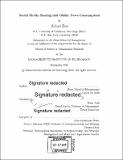Social media sharing and online news consumption
Author(s)
Zhao, Michael (Michael F.)
DownloadFull printable version (5.356Mb)
Other Contributors
Sloan School of Management.
Advisor
Sinan Aral.
Terms of use
Metadata
Show full item recordAbstract
The ever increasing ubiquity of social media platforms has led to the emergence of an incredibly important positive feedback loop between social media sharing and online content consumption. The potential of this feedback loop is critical to marketers, publishers, politicians, and beyond. However, identifying causal effects in this context is very difficult. The data requirements are quite demanding, calling for data from both social media platforms and content producers. In addition, feedback loops inherently suffer simultaneous equation bias. Using regional rainfall as a natural experiment, we use a novel panel-IV strategy to identify positive and significant cross-region "peer effects" in online news viewership: a 1% increase in within-region viewership causes external viewership to increase by approximately 0.06%. Moreover, evidence suggests that social network sharing is a primary driver of these peer effects. We find that the peer effect is stronger on viewership referred from social network sources compared to viewership referred from search engines. Beyond this, we find that social network connectivity moderates the strength of this peer effect: "strongly-connected" regions exhibit more positive and significant peer effects relative to more "weakly-connected" ones. Our provides a first step in understanding how social media platforms generate value for online content producers.
Description
Thesis: S.M. in Management Research, Massachusetts Institute of Technology, Sloan School of Management, 2018. Cataloged from PDF version of thesis. Includes bibliographical references (pages 59-62).
Date issued
2018Department
Sloan School of ManagementPublisher
Massachusetts Institute of Technology
Keywords
Sloan School of Management.